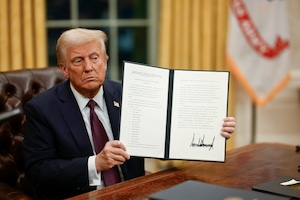Trump Signs Reciprocal Tariff Plan to Promote Fair Trade and Encourage U.S. Manufacturing

On February 13, U.S. President Donald Trump signed the "Fair Reciprocal Plan," directing agencies to draft tariffs that would impose reciprocal tariffs on foreign goods. These tariffs will be tailored to each trade partner, considering not only direct tariff equivalents but also non-tariff barriers, such as unfair subsidies, regulations, VAT, exchange rates, and more. Additionally, Trump announced plans to impose tariffs on automobiles, semiconductors, and pharmaceuticals. The reciprocal tariffs will not be immediately implemented, but U.S. Secretary of Commerce, Howard Lutnick, stated that the relevant plans would be submitted to Trump by April 1.
Trump explained that "reciprocal tariffs" are a fair way to compete: "We will charge the same amount as they charge us." He emphasized that trade partners, including China, Japan, South Korea, and the EU, should not take advantage of the U.S. He argued that this plan would increase U.S. Treasury revenues, and while it might lead to inflation in the short term, companies seeking to reduce tariffs would establish manufacturing in the U.S., which would ultimately benefit the U.S. in the long run.
However, the World Customs Organization's 186 member countries each have different tariff rates, with varying tariffs for different products. Implementing the reciprocal tariffs Trump desires will be a challenging task, especially for products the U.S. does not produce. The tariffs have not been immediately enforced, which suggests that Trump is waiting for reactions from other countries to use it as a negotiation tactic.
Countries like Germany, Ireland, and Italy within the EU, which impose VAT, are expected to face higher tariff rates. These countries primarily export pharmaceuticals, medical devices, automobiles, and automobile parts to the U.S., meaning that the prices of these products will likely rise.
Since taking office, Trump has already announced tariffs on all steel and aluminum imports, a 10% tariff on goods from China, and, after negotiating with Canada and Mexico, has temporarily suspended the imposition of a 30-day tariff.
- 95 reads
Human Rights
Fostering a More Humane World: The 28th Eurasian Economic Summi

Conscience, Hope, and Action: Keys to Global Peace and Sustainability

Ringing FOWPAL’s Peace Bell for the World:Nobel Peace Prize Laureates’ Visions and Actions

Protecting the World’s Cultural Diversity for a Sustainable Future

Puppet Show I International Friendship Day 2020

